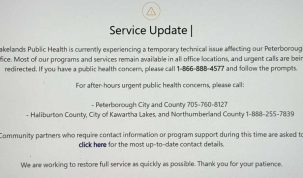By Cecilia Nasmith/Today’s Northumberland
Council agreed that the town deserves top marks for its response to the catastrophic storm that hit Ontario Dec. 23 through 25.
Director of Legislative Services Brent Larmer described conditions as being “like a snow globe shaken really hard by an energetic kid.”
The verdict came at Monday’s committee-of-the-whole meeting following a lengthy and detailed report by Larmer – who also served as Community Emergency Management Co-ordinator, with Fire Chief Ellard Beavan as alternate CEMC, operating under the provisions of the Town of Cobourg Community Emergency Management Program bylaw approved in 2012 and updated in 2015.
Members of the Emergency Operations Team that swung into action include Chief Administrative Officer Tracey Vaughan as well as the Manager of Facilities and representatives from the Cobourg Police Service, Public Works, Lakefront Utility Services Inc. as well as the town’s Communications and Public Works divisions.
“We had 12 meetings over two days, including on Christmas morning,” he said.
“Meeting virtually made a real difference, because a physical location has been a tradition forever.”
More than 50 front-line staff contributed to the response-and-recovery effort over the course of a week and a half, both during the storm and after.
“And Cobourg residents – it’s pretty incredible to see everyone coming together to check on neighbours, showing up, working together.”
Larmer had constructed a detailed timeline that started Friday, Dec. 23 when the storm came in.
“The government and weather people declared a weather bomb for the Great Lakes,” he said, describing the combination of Arctic air, snow and high winds that descended on a layer of ice caused by an earlier rain.
Environment Canada urged everyone to consider changing their plans.
“This is Christmas after two years of Christmas staying at home and not visiting loved ones,” Larmer pointed out.
“We knew that the public was not going to put up with that.”
Larmer displayed a map of the Highway 401 corridor to illustrate the challenge. Wind gusts were 108 km/hr in Cobourg, the highest of all the communities along the line. Brighton was second with 104, but the other communities had readings more like 85 in Belleville and 77 in Kingston.
It did not deter many from their travel or last-minute shopping. Meanwhile the town was challenged by a number of staff away (as in out of the area) on vacation and a vacant Emergency Planner position.
The first reports of power outages came along Friday at about 11 a.m. The EOC was activated by 1:30 p.m. At 6:30 p.m., the town declared a Significant Weather Event, which means the weather poses a danger to drivers and pedestrians.
By 9 p.m., power began being restored, including to the Cobourg Community Centre. At 9:30 p.m., the EOC that the county-run overnight warming shelter at St. Peter’s Anglican Church would remain open the following day – Dec. 24. The last of several press releases from the town that day, came out at 11:30 p.m. urging all residents to stay home unless absolutely necessary, and announcing that the CCC would stay open for extended hours Saturday as a place to warm up and charge phones and other devices.
The EOC took stock Saturday morning. Some long-term-care homes had no power. Multiple trees and power lies were down. The Best Western had begun receiving stranded travellers from Highway 401, as well as those affected by accidents and road closures.
Multiple municipalities were issuing emergency declarations, and widespread road closures included Highway 401. Drivers’ GPS systems were diverting them on to poorly maintained and very hazardous side streets. When municipalities put up barriers on these dangerous roads, drivers merely drove around them.
Enough reports of a stranded train were filtering in that the police investigated at 8:30 a.m. And found a passenger train stopped by a fallen tree on the north tracks south of Daintry Crescent. Passengers had been on the train more than 15 hours and resources were running low. Century Transportation and Community Care Northumberland co-ordinated transportation for them to warmth and respite. A public enquiry is being held over this incident just now.
Speculating that as many as 300 people might require overnight accommodations at the CCC, they contacted the Red Cross for assistance. Staff offered areas to seek comfort and opened the canteen to distribute free refreshments. The welcome news came at 9:30 p.m. that power was restored to all affected residences and, after those residents returned home, five individuals were left. The Best Western was offering space, so they were transported there.
Larmer had statistics on staff time and emergency-response costs for all departments – the Fire Department, Cobourg Police Service, Lakefront Utilities, Century Transportation, Public Works, Community Services, Communications.
He also had a list of lessons learned.
1 – The town’s EOC and team worked well when the crunch came.
2 – Strong liaison relationships with external agencies are critical in emergencies.
3 – The CCC must have an uninterrupted power source and an upgrade to greater generator response.
4 – Timely and accurate communication of information is critical for members of the public.
5 – The impact of traffic signals being out was minimized due to the lower holiday-traffic volumes.
6 – The town’s generators are pretty well all diesel, so there is a need to understand them better in terms of hours of operation and refueling requirements.
7 – Traditional forms of communication are insufficient in a situation of widespread power outage, calling for quicker sources and more social media.
8 – There needs to be public education for residents on their own emergency readiness, including the preparation of 72 Hour Kits.
9 – Locating vulnerable residents is a challenge.
10 – Linkages must be improved with community groups that can deploy resources such as food for the warming centre and help with vulnerable residents.
11 – A dedicated call line or centre that efficiently fields calls from residents is vital.
12 – On-site emergency resources – such as cots, pillows and blankets – need to be on site where they are needed.
13 – Accurate data and analytics are critical in shaping the town’s emergency-response efforts (such as locations of power outages and identification of vulnerable areas such as long-term-care homes).
14 – A virtual EOC library is needed for EOC members on existing plans and emergency contact number for virtual members due to travel restrictions.
15 – A more proactive approach for early communications to the public and monitoring of weather events is called for.
Larmer ended his presentation with 10 recommendations.
1 – Train additional staff members in EOC operations, and create an expanded roster of staff available over extended periods.
2 – Integrate and purchase a town-controlled Public Alerting System that can be used to educate and support residents and visitors leading up to, during and following an emergency.
3 – Research and plan a communication call centre to be activated during an emergency, and set up and establish a central line.
4 – Provide further emergency-preparedness education.
5 – Reach vulnerable residents by establishing a formal network of community groups and organizations (ratepayers’ associations, faith groups, community agencies) to disseminate information generated by the town.
6 – Evaluate permanent full back-up power for strategic municipal assets (like the CCC).
7 – Utilize the town’s SharePoint system to make virtual EOC items available to all EOC members.
8 – Initiate a new update of the town’s emergency plan, and incorporate the IMS model.
9 – Work with the town’s planning department through the Development Review Team to proactively request and inquire on back-up power plans with developers and applicants for multi-unit and long-term-care residences.
10 – Leverage the upcoming Integrated Community Sustainability Plan recommendations on ways to put in place strategies to mitigate climate and extreme-weather events.
Putting power lines underground is an obvious addition to the list, Larmer said. But because of the costs of putting existing lines underground and the vastly increased cost of maintaining them makes it too impractical.
Councillors were impressed not only with the town’s response but also with Larmer’s report and analysis.
“With as much sincerity as I can muster, I want to say that my chest swelled with pride when I read this on the exemplary job, in the handling of this emergency situation by Cobourg at large, but also specifically staff and others,” Councillor Randy Barber said.
“I think this town was prepared, this town had the type of individuals working here that were able to make personal sacrifices in order to help strangers out, and I think it was just an exemplary job.”






















